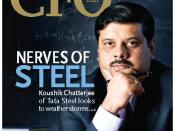If there is one constant Corporate America can depend on, it is "change". The drivers of change--workforce needs, costs and, most importantly, competition. Change is difficult for everyone, especially at the business aspect. The increasing responsibilities of Chief Financial Officers (CFO's) and Chief Executive Officers (CEO's) require us to look beyond the normal responsibilities and consider how the forces behind these driving changes are shaping each. Lately we are seeing that companies are looking at hiring or transferring CFO's into CEO positions. But the question we ask ourselves is "do CFO's have the insight and foresight to handle the position?"
It has been common practice for the CFO to be an accountant by trade, primarily because the financial aspects of the position were such an integral part of their responsibilities. Now we are finding that business are not focusing on the accounting function as much as they used to. "The CFO provides the critical business, financial, and administrative support, as well as professional guidance."
(West) Companies want CFO's who become CEO's "to know more about production than many of them have know in the past." (Picker)
The most common problem is that accountant, or "bean counters", focus on bottom line numbers. Such was the problem when GM CEO Roger Smith (a former CFO) saw high hourly wages as a primary financial problem and decided to go fully automated. (Picker) This decision in turn cost the company even more in the long run. As you can see here, being "cost-conscious" can have its advantages and disadvantages. But not knowing about all aspects of the business in question can leave the company in ruin.
This is not to say that all CFO's cannot turn a company around to be a Fortune 500 contender. When Wayne Calloway became PepsiCo's president almost 15 years...


